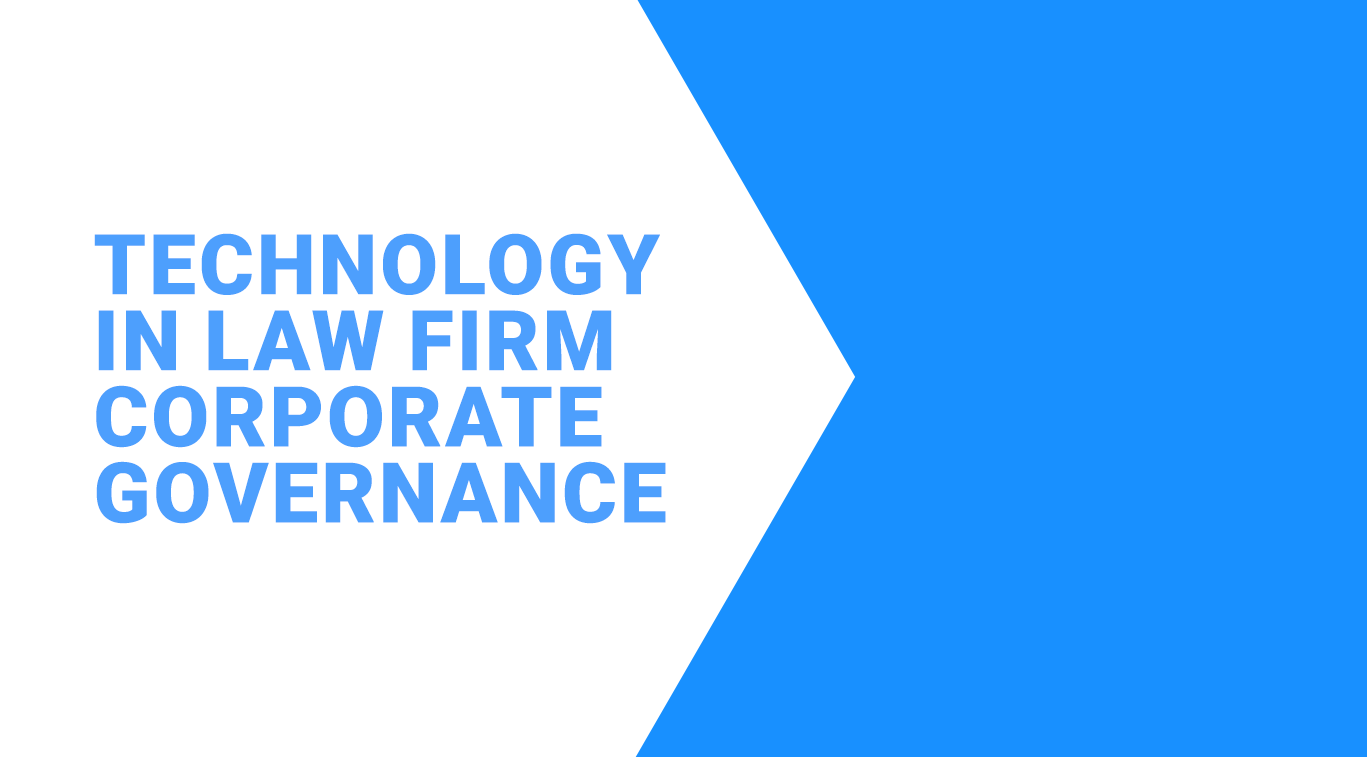Technology in Law Firm Corporate Governance

Written by Maryam Khan
Blogger

The practice of corporate governance is referred to as a system consisting of a set of rules, practices, and measures designed to direct, control and manage a company [1]. Corporate governance is extremely important for law firms as well. At the end of the day, law firms, too, are businesses that require a strategic approach to corporate governance to allocate responsibility and balance the interest of the firm’s stakeholders [2]. These stakeholders include a law firm’s clients, shareholders, executives, and directors [3]. Each stakeholder has goals and interests which need to be protected and achieved. A strong corporate governance strategy powered by the right tools and resources can help achieve these objectives sustainable, cost-effective, and profitable. A technology-backed corporate governance procedure and software generates insights enabling law firm management and directors to establish a more ethical and data-driven decision-making process to construct a sustainable business. Simply put, corporate governance is also referred to as a “toolkit” for effective facilitation of successful company (In this case, law firm) management [4]. Now, with the integration of legal technology solutions, law firm corporate governance has become more streamlined, allowing law firm leadership to work towards creating a sustainable and profitable practice.
A good corporate governance system provides many benefits which law firms can leverage. The main objective behind integrating such software is to develop greater trust, transparency and accountability within a firm, which is necessary to ensure financial stability and secure investments [5]. Additionally, corporate governance technology minimises corruption, risks and even internal mismanagement. It guides company members, including shareholders and directors, to build a substantial company brand and reputation [6]. However, if a law firm has a poor corporate governance framework and is not making use of the right tools and resources available, the firm will be unable to enjoy these benefits and will also be more open to risk and prone to business failure [7].
How Are Law Firms Taking Advantage?
Technological developments and innovations have transformed the legal sector. Today’s legal departments are working in a space-age of technology, with artificial intelligence, data analytics and blockchain technology being the norm. Corporate governance technology is one solution backed by such technologies shaping a law firm’s corporate governance practice. Corporate governance software provides law firms with a framework to align their sector-specific development strategies with their overall business strategy using a formal structure and data generated insights that measure performance against the firm’s goals [8]. Such software gathers business-critical information to manage a law firm’s corporate entities and ensure good governance. Moreover, technology in corporate governance involves the use of cloud storage and cloud based legal software which functions as a centralised repository for secure document management and filing, which ensures controlled access to important meetings with board directors, internal departments or audit committees [9].
Subsidiary Governance
The majority of successful law firms today have several entities and branches they own that provide complementary services alongside the firm’s practice. Good corporate governance assists in the management of these entities. Law firms, for instance, have several offices nationally or internationally, and all offices and branches must operate under the same conduct and perform at the same level. Legal technology such as practice management and entity management software allows for better efficient communication throughout all these subsidiaries. Using technology allows law firm branches, subsidiaries and alternative legal service providers to collectively operate while the parent company is involved in the management and key decision making. Moreover, with a good governance system backed by technology, it becomes easier to supervise their business without infringing their independence. Integrating technology within this function allows law firms to improve their internal operations, work collaboratively and develop their business.
Automated Workflows
Practice management systems, task management systems and case management systems allow lawyers to benefit from workflow automation. Eliminating manual tasks and turning towards automation allows greater access to information and documents within a law firm [10]. This easier access enables greater communication, reducing delays and increasing overall productivity levels within a firm. Automation can be used in the legal departments for automated billings, the input of client information, managing case deadlines, organising documents etcetera. Having individual components automated results in the whole corporate governance process becoming easier as information is readily available, documents are organised, and all activity is tracked. These features further ensure that tasks are properly distributed, sensitive client information is safe, reduces mistakes and drives efficiency.
Stakeholder Engagement
Stakeholder relationships and expectation management are also crucial for success. Stakeholder engagement is important to ensure a law firm’s operations and decision-making process run smoothly. Law firms can also use legal technology solutions in this regard to increase communication and engagement. This includes sending out automated emails, notifications and trackers when working on a project that reflects the interest of the stakeholders involved [11]. Project management and practice management systems can store all stakeholder related information in a secure, centralised location. This includes stakeholder contact information, stakeholder issues, stakeholder responsibilities, engagement records, reports or any other stakeholder-related issue [12]. A law firm needs to be organised when dealing with its stakeholders, affecting their impression of the firm and impacting their willingness to engage and collaborate. Being organised and establishing a comprehensive management strategy should be a key priority for firms as successful engagement improves the relationships with stakeholders and their entities. Therefore, law firms can successfully engage with their stakeholders and grow the firm using the right technology-enabled tools and resources.
Market Research
Conducting market research is extremely important for law firms, just like any other professional services company. Effective market research helps law firms understand who their potential clients are and what they want and need by gaining insight into the firm’s competition, the firm’s strengths and weaknesses, and the demographics of potential clients [13]. Market research allows a law firm to develop a strategic blueprint for its long-term business development plans [14]. Moreover, developments in technology have led to great changes and trends in society which law firms need to be aware of to stay competitive in the highly volatile legal market. For example, the development and application of cryptocurrency and Non-Fungible Tokens (NFTs). A law firm’s clients are also becoming more involved in these areas and require the services of law firms that are experts in new trends in the commercial market. Moreover, a law firm’s knowledge of the current market state allows law firm management to anticipate the needs and expectations of client needs. This knowledge allows them to redirect their investments, change their corporate governance mechanism and act on new market research findings [15].
Document & Information Management
Information and records management plays a crucial role in corporate governance. Law firms being more data-driven than ever before has resulted in the need for them to hold large volumes of data and information. Therefore, they need to maintain accurate client records, regulatory forms, contract templates and other documents. Lawyers can easily organise this information through document management software, legal file management software, or a records management system. One of the major issues that law firms and other professional services companies frequently face is also known as experiencing a governance deficit. This refers to when board directors or those in management do not have access to the right information at the right time to ask the right questions during meetings or workshops [16]. Using workflow and document management systems or a legal filing system allows all information to be in a secure, centralised location where data is constantly updated. Such software also deletes necessary information, which helps when conducting data hygiene and clearing out old information and templates. This avoids confusion and unnecessary document storage and ensures that the relevant information is easily accessible.
Board & Committee Meetings
Video meetings have become a norm following the pandemic and should also be seen as an opportunity to enhance corporate governance and transparency. Most key decisions such as replacing a director, approving finances or extending benefits to all employees are now being made virtually despite traditionally requiring a formal meeting environment. Through smart boardroom technology and video conferencing software, board and committee meetings held remotely are much more organised [17]. Moreover, using these legal technology solutions enables greater collaboration and effective communication during these meetings, increasing engagement and productivity, especially when working in a remote or hybrid environment.
The Rise of Modern Governance
Modern corporate governance is on the rise, enabling law firms to efficiently respond to corporate needs without compromising security using cloud data protection tools.When dealing with an urgent matter, law firm directors or management may resort to using non-secure file sharing applications and their personal or business email accounts to resolve a matter without thinking of the level of security. Simply doing so allows a cybercriminal to gain access and hack into the insecure mobile application or network, putting the firm’s clients and their reputation at risk. Without using secure technology to manage communications and board meetings, law firm management is at risk of unintentional data breaches and the risk of sharing business confidential information. Integrating technology also avoids the governance deficit discussed earlier, giving law firms access to the right information and the right time to make strategic decisions for business development.
Moreover, automated solutions for modern governance enhance accountability by reducing the risk of human error. This includes typos, missed words and incorrect spellings, which can significantly impact a firm’s reputation and profitability. Data analytics and software solutions can track how a board has reached its decision, highlighting the reasoning behind each move. Such features are great for meeting audit and compliance requirements as they allow law firms to record their decision-making. This ensures that those involved are held accountable when dealing with internal investigations and acts as a record when needed to be reviewed by shareholders, regulators, or any other third party [18].
Final Words
Integrating technology to improve a law firm’s corporate governance requires a culture of innovation alongside a corporate culture that fosters and supports the best practices for good governance [19]. Moreover, using technology in corporate governance ensures that legal departments are equipped with the best tools to manage internal and external data and streamline their workflow. These legal technology software tools are extremely multi-faceted and will improve a law firm’s corporate governance and streamline many other functions, including invoice management, client relationship management, and case management. These benefits allow law firms to manage their corporate records better, ensuring a good standard of corporate governance, compliance and risk management [20].
References
[1] ‘What is Corporate Governance’, The Ireland (2022) at https://www.cgi.org.uk/about-us/policy/what-is-corporate-governance>
[2] ‘Corporate Governance: Purpose, Examples, Structures And Benefits | E-CSR’, Youmatter (2022) at https://youmatter.world/en/definition/corporate-governance-definition-purpose-and-benefits/
[5] Ibid
[6] Ibid
[7] ‘Corporate Governance’, (Corporate Finance Institute, 2022) at https://corporatefinanceinstitute.com/resources/knowledge/other/corporate-governance/
[8] ‘Importance of Governance Processes in Software Development’, 3Pillar (2021) at https://www.3pillarglobal.com/insights/importance-of-good-governance-processes-in-software-development/
[9] ‘Must-have Features For Corporate Governance Software’, Wolters Kluwer (2020) at https://www.wolterskluwer.com/en-gb/expert-insights/must-have-features-for-corporate-governance-software
[10] Mary K, Pratt, ‘What Is Workflow Automation And Why Is It Important?’ (SearchContentManagement, 2022) at https://www.techtarget.com/searchcontentmanagement/definition/workflow-automation
[11] Britney Blomquist, ;What is Stakeholder Relationship Management (SRM) Software?’, Jambo (2020) at https://blog.jambo.cloud/stakeholder-relationship-management-srm-software
[12] Ibid
[13] Find Law, ‘How Market Research Can Benefit Your Law Firm’, FindLaw (2020) at https://www.lawyermarketing.com/blog/how-market-research-can-benefit-your-law-firm/
[14] Aranca, ‘Do Legal Firms Need Market Research?’, Aranca (2021) at https://www.aranca.com/knowledge-library/articles/business-research/do-legal-firms-need-market-research
[15] Ibid
[16] Nicholas J Price, ‘What Is a Governance Deficit’ Diligent (2020) at https://www.diligent.com/insights/board-governance/what-governance-deficit/
[17] Varun Eknath, Tiziana Londero & Syuzanna Simonyan, ‘Are Virtual Meetings For Companies And Board Members The New Normal?’, World Bank Blogs (2021) at ’ Shareholdershttps://blogs.worldbank.org/developmenttalk/are-virtual-meetings-companies-shareholders-and-board-members-new-normal
[18] Nicholas J Price, ‘Achieving Strong Corporate Governance Through Technology’, Diligent (2018) at https://www.diligent.com/insights/corporate-governance/achieving-strong-corporate-governance-through-technology/
[19] Ibid
[20] Ibid (9)








